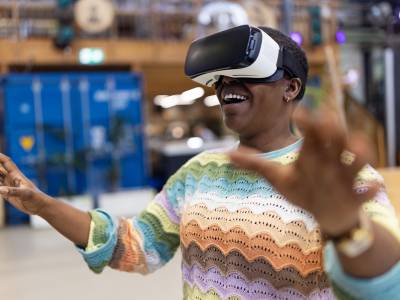Business schools are stepping into the metaverse, as they hope these immersive, 3D virtual worlds, filled with avatars, can help extend the reach of business education.
Studying in the real world has its advantages, including teaching of interpersonal skills and networking. And it can be costly to fund purchases of the hardware and software needed for metaverse projects. However, the metaverse is a much-hyped technology.
It burst into the public consciousness in 2021 when Facebook renamed itself Meta. While some of the early enthusiasm has faded as other technologies have come into view, schools are still testing out metaverse concepts in the belief that it can make online learning more engaging.
“The metaverse can make collaborative learning sessions more interactive, such as doing teamwork with fellow students, practicing a presentation, or deep-diving into analysis with shared screens,” says R Ravi, professor of operations research at Carnegie Mellon University’s Tepper School of Business in the US.
“If designed well, it has the potential to more easily replicate the cadence of the back-and-forth discussions that happen in live classes,” he says, but adds: “It cannot play much of a role in accurate assessment of interpersonal skills.”
Building trust and exhibiting competence are two critical skills in being a successful manager, but this is better suited to in-person learning format. “It is harder to do in an avatar form in a metaverse,” Ravi says. “Many business classes that train in these skills will also be difficult to port to this environment.”
Tepper runs one of America’s highest-ranking Online MBA courses, alongside a successful in-person version of the degree. Even as metaverse technology becomes more sophisticated, Ravi does not envision a time when distance learning ever replace traditional classes. “However, it will provide a good complement to hybrid education, especially for collaborative work that is a significant aspect of business education,” he says.
Enhancing the learning experience through technology
Another leading Online MBA course provider is Warwick Business School, in the UK. Dot Powell, director of teaching and learning enhancement, says: “If logistical difficulties such as the need for globally dispersed students to access content via VR headsets can be overcome, many business subjects might be enhanced by the introduction of metaverse elements to course delivery.
“For example, in operations management the use of VR offers the possibility of ‘visiting’ large production facilities to explore their operations first-hand. The use of avatars may also enable students to experience alternative roles in the workplace far more effectively than previously.”
However, she notes that there are challenges associated with cost and expertise -- it is such a new field that knowhow around its use in education is still only just emerging. Even so, the metaverse could still make a big difference to online business education.
Powell says: “I think it will enhance learning where it offers something that cannot be done in another way -- such as by bringing together geographically dispersed people into a location that is of interest, or by facilitating immersive experiences of working roles and situations. Done well, every immersive experience should be unique to the learners involved.”
Schools such as Warwick have been investing in education technology for some years, but this was accelerated by the coronavirus pandemic, which forced even in-person courses to go online. “I definitely think we have become more aware of the need to innovate, possibly because what used to be seen as innovative, such as online synchronous taught sessions, is now part of the everyday experience,” says Powell.
The metaverse ‘brings learning experiences to life’
Other schools have also been exploring the metaverse. Roselva Tunstall, director of the Learning Innovation Lab at ESMT Berlin, a business school in Germany, says the metaverse can play a number of roles in online business education, depending on the digital strategy of the institution or the learning goals of the program.
For example, if the institution is seeking more inclusive educational formats, they may opt for a metaverse campus, allowing learners from anywhere in the world to have an immersive experience with their peers beyond a 2D zoom experience.
In addition, the metaverse can teach learners about the business opportunities the metaverse can offer their employers, in a much more immersive way. “The metaverse can bring learning experiences to life through experiential learning,” says Tunstall.
“For metaverse experiences built using blockchain technology, there is the possibility to use digital wallets in the metaverse to purchase NFTs. Would you rather read about NFTs or actually engage in the purchasing of them in a 3D environment?” she asks.
The coronavirus has propelled business schools to explore new opportunities for learners to engage with their educational offerings and events, but Tunstall believes that metaverse technologies can work hand-in-hand with in-person experiences.
“I don’t believe it’s a zero-sum game. Distance learning has allowed for learners to engage in business school education who may otherwise not have had the opportunity because of work and life expectations,” she explains.
“Nevertheless, I do not see distance learning replacing on-campus learning because I believe learners will continue to want physical face-to-face experiences instead of experiencing this through an avatar.”










